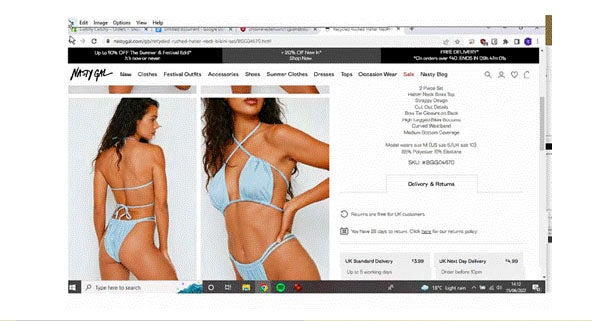ARTICLE AD BOX
A bikini designer has lost a David and Goliath court campaign against online fast-fashion giant
Sonia Edwards, 53, from Newport, Gwent, began her design career in 2010, exhibiting at the Clothes Show Live in 2011, where her signature “Infinite” multiway bikini top first hit the catwalk.
Celebrities, including Liss Jones from The Voice and Welsh media personality Lateysha Grace, have worn her designs, while her work has also featured in Vogue.
But she has now lost a legal clash with Boohoo.com and four linked companies over alleged infringements in relation to five designs, including the bikini top, after a judge said that her swimwear had "low originality".
He also found that despite "evidence...indicating that designs are copied from social media on occasion" by Boohoo companies, it was unlikely her design had been seen to be copied by Boohoo's designers, as she "had just 268 Instagram followers in 2020".
Rejecting her complaints of copying, he said: "The stark truth is that there are also only so many ways to design clothing to fit the human body."
The companies Ms Edwards sued alongside Boohoo.com were Prettylittlething.com Ltd, Nasty Gal Ltd, Miss Pap UK Ltd, and Debenhams Brands Ltd.

The alleged infringements related to five designs marketed by Boohoo or the linked companies: a halter neck bikini top; rib organza mesh puff sleeve top; Taylor velvet ruched midi skirt; a twist front skirt, and leather front ruched leggings.
Presenting her own case against a team of lawyers representing Boohoo and the other companies, Ms Edwards sought a court order preventing them from importing or selling various fashion items which she claimed are copies of her designs, plus a court declaration that Boohoo has infringed the design rights of her company, Cwtchy Cwtchy, with compensation to be paid.
She told Judge Tom Micheson KC at London's High Court: “I am a self-taught designer who relies on a hands-on, improvised approach when designing, through trial and error until I produce a design that satisfies my own visions. I don’t follow trends, and work with my own creative freedom."
Ms Edwards told the judge she began to notice more of her designs proliferating online during the Covid lockdown.
Focusing on her “infinite bikini” line, she said the garment could be “tied in lots of different ways,” alleging that a similar item has been marketed by one of the defending companies, Nasty Gal Ltd.

At issue with the bikini were several telltale features which she said betray the products marketed by Nasty Gal as copied from her work, including a top strap that forms “one piece” without fastening and two front breast panels with “openings at the top and bottom allowing the strap to be passed through”.
However, Boohoo’s KC, Andrew Norris, argued that the alleged similarities are not specific enough to be protected under copyright law.
“These features do not describe protectable shape and configuration," he said. "They are concepts and methods of construction and are not protectable features in design law in accordance with…the Act.”
Adding that the concept of a “multiway” bikini was “well established,” the barrister claimed there was nothing unique about the disputed design, noting that its “selling point” for Ms Edwards was the fact that its wearer can change how they wear it according to their whims.
“Whether the top strap forms one piece or is two pieces - i.e. which way the ends of the strap go - is the wearer’s choice and is not the shape or configuration of the design,” he said.
Giving his ruling, the judge said: "This is an action for infringement of unregistered design right in the design of various items of clothing. The particular sector in issue is fast-fashion - where companies engage in releasing hundreds of different styles of low-cost garments per week, based on current trends found in social media.
"The claimant, Sonia Edwards, began designing clothing in 2010. She mainly promoted herself through social media with the aim of licensing her designs to others.
"Her work at that time achieved recognition in Vogue Magazine and Drapers Magazine and was featured by The Fashion Network amongst others. She also exhibited at the Clothes Show Live in 2011, at the NEC in Birmingham. She has recently given up designing clothing, partly as a result of the present litigation.
"The defendants are all part of boohoo, the well-known fast-fashion group.
"The claimant has been complaining for a number of years about the alleged copying of her clothing designs by various big fashion brands, including ASOS, Missguided, Moschino and Shein. Her complaints against boohoo have also been going on for some years.
"The claimant's case is that she possesses unregistered design right in the shape and configuration of the...five garment designs.
"The defendants say that the claimed features are really descriptions of generalised concepts, rather than actual shape and configuration in the design."
Dealing with the bikini, the judge threw out Ms Edwards' claim, said the opportunity for any copying was "extremely limited," citing the "relatively low profile" of Ms Edwards' social media channels.
"The contemporaneous material shows that the claimant had only a handful of likes and comments on the Facebook pages showing her designs over the relevant period. Her Instagram account Scrunchbooty had just 268 followers in 2020."
He said it was more likely that someone would have come up with a similar design themselves without copying Ms Edwards' ideas.

"That is a function of the low originality of the claimant's design ...which is generic enough that other people in the industry are quite capable of coming up with the same design independently," he said.
"For all these reasons and in spite of the evidence...indicating that designs are copied from social media on occasion by the defendants, I reject the suggestion that the claimant's (bikini) has been copied in the present case."
He went on to dismiss the claims relating to the other garments too, finding that the "defendants did not copy the claimant's designs."
"I recognise that Ms Edwards will be disappointed in this outcome. She has campaigned for some time to shine a light on what she sees as injustice against the small designer in the fashion industry.
"I have no doubt that her grievances are sincerely held, but she has subjected the defendants and others to a torrent of complaints over a period of many years. Regrettably, the complaints that I have had to adjudicate are misdirected, either as a matter of fact or law, or both.
"I acknowledge that copying undoubtedly takes place within the fashion industry, particularly in fast fashion. Every time the defendants ask manufacturers to reproduce images found on social media, there is a risk of someone's design right being infringed.
"But the stark truth is that there are also only so many ways to design clothing to fit the human body.
"Given the enormous numbers of articles being churned out by the likes of the defendants each week, it is completely unsurprising that as a matter of chance, some of these resemble articles designed previously by others, including the claimant.
"And whilst the probability of chance reproduction in such circumstances is high, the likelihood of a fast fashion company using a social media feed with few followers published many years ago is low.
"It is for these reasons that I have dismissed the claimant's suspicions about alleged copying by the defendants."









 English (US) ·
English (US) ·